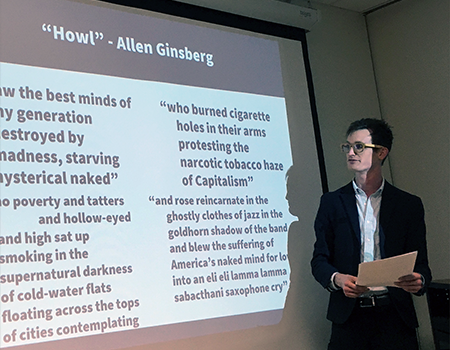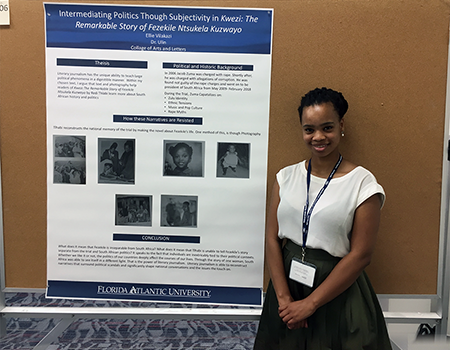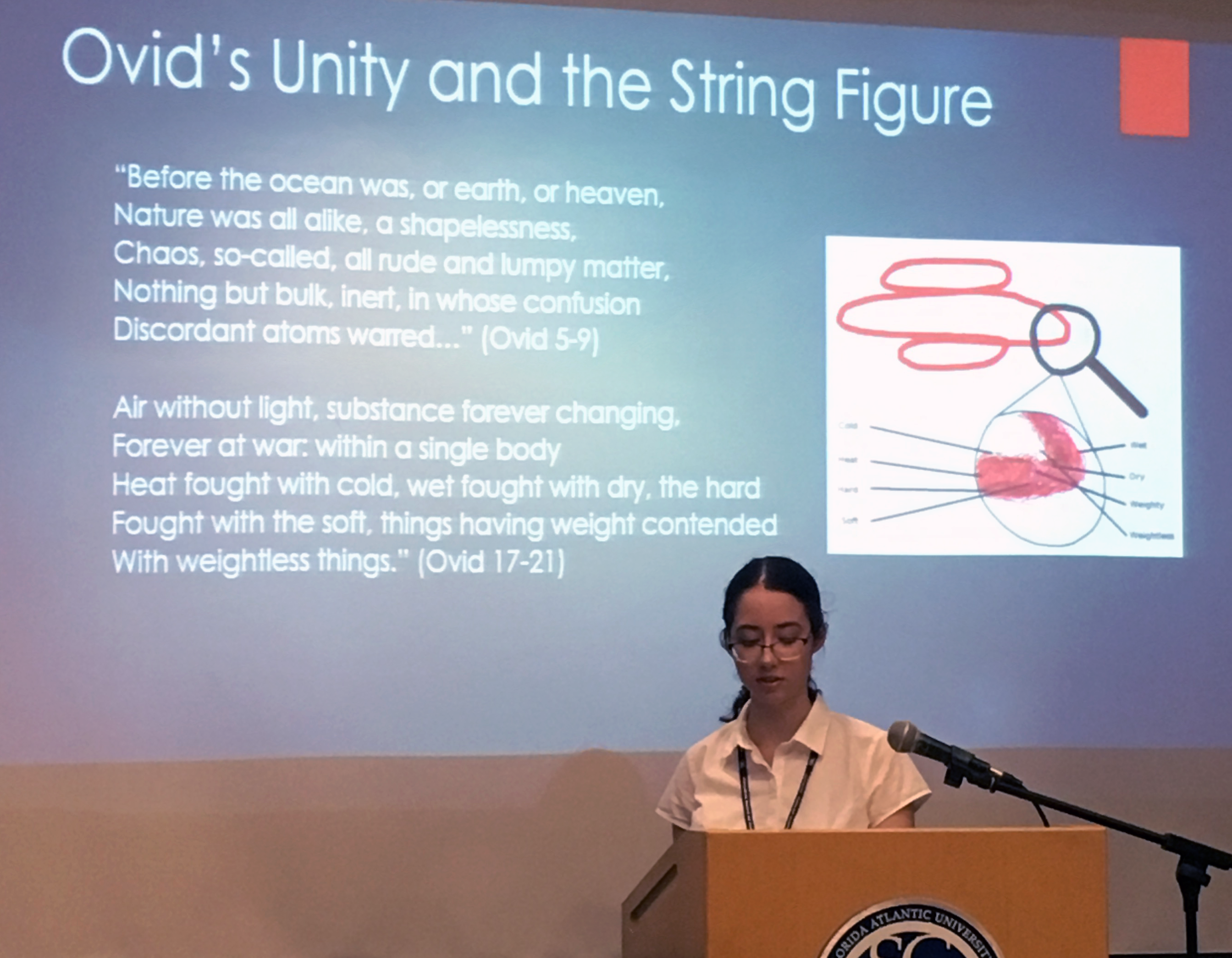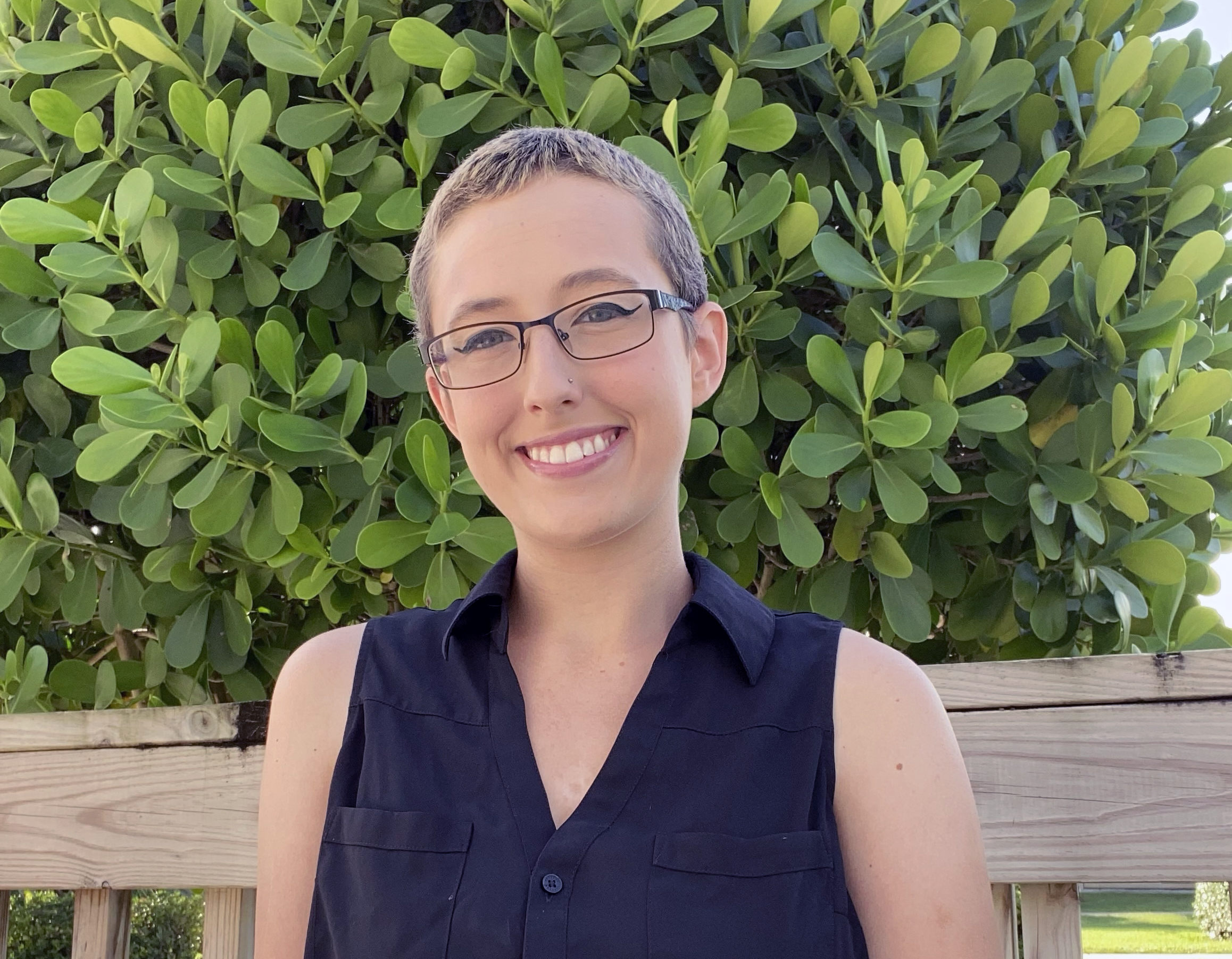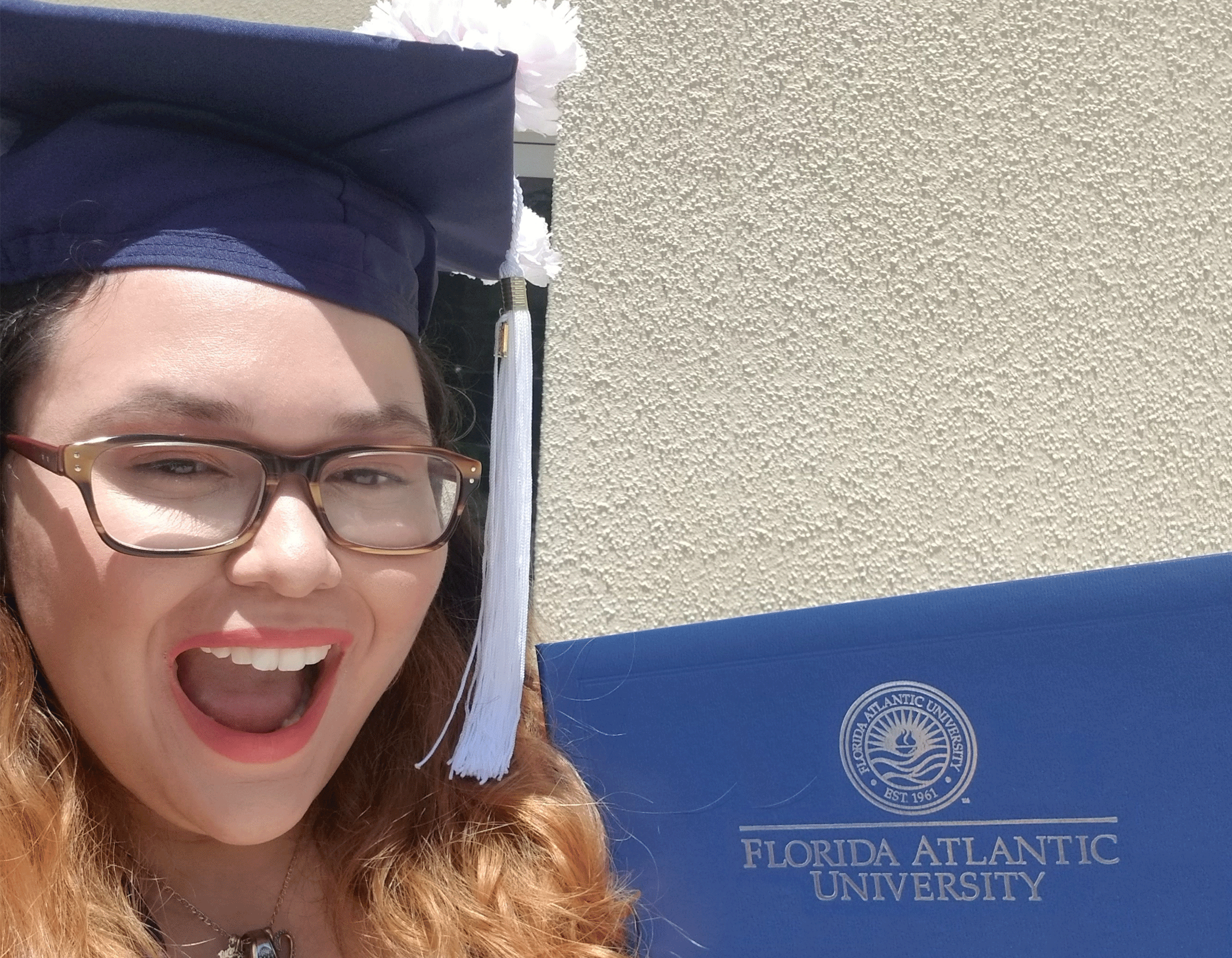
English Honors is a highly selective honors program for our best and brightest English majors. The program is a sequence of two courses:
- ENG 4932 Honors Seminar in the Fall 2024 — Honors Seminar is about approaches and methods for advanced literary study. You'll learn the critical, writing, and research skills you’ll need to succeed in English Honors. (ENG 4932 will likely count as Category I or Category II, depending on what you need)
- ENG 4910 Honors Research (RI) in the Spring — Honors Research is about writing your thesis over the course of the semester. Your professor will help you every step of the way.
Both classes are low enrollment to make sure you get the attention and support you need to plan, research, and write your thesis project. You’ll have support from your Honors course professors and an additional field advisor. Their job is to see you through.
As an English Honors student, you get
- to graduate with honors—wear honors cords at graduation and get an honors designation on your FAU transcripts
- a resume line that will make you stand out on the job market and set you apart from other applicants
- a credential to prove your ability to research, write, and engage in sustained projects
- a dedicated program, professors, and an advisor to provide support and make sure you succeed
- a small community of exceptional English majors who support each other, share ideas, provide feedback, and see each other through
- an opportunity reserved for our very best English majors
- a chance to write about something something you love or you're interested in—you can expand work you've done in a previous class, or you can choose a whole new topic
- preparation for graduate programs in English, Communications, Law, or Medicine and an exceptional writing sample for your grad school applications
Don't take my word for it. Check below for what some recent English Honors graduates have said about the program:
Each student could choose his or her own area of interest for the honors thesis, and faculty genuinely cared about helping us construct better papers. Having so many different professors listen to my ideas, give advice, and mentor me throughout my honors thesis allowed me to have a much more in-depth and thoughtful writing experience.
This course has shaped me as a person and a scholar. I can honestly say, after graduating and reflecting on my last year of college, that I wouldn’t be the writer I am today without this program.
My time in the Honors Program was one of the best parts of my undergraduate career, and I'm so grateful I had the opportunity to be a part of it! [. . . ] I felt supported and challenged by peers and faculty alike, and loved the opportunity to dive into research that genuinely fascinates me, to share what I learned with others, and apply it to contemporary issues.
I felt connected to and supported by the faculty and my fellow students. I am so grateful to those who went out of their way to help me succeed in actualizing the vision I had for my thesis project, one that was as difficult as it was exciting to approach because of the level of investment I had in doing it justice.
The thesis is a researched, academic paper on a topic, subject, and/or area of interest of your choosing. You can choose a new topic or expand on a past paper or topic from a previous class.
Recent English Honors students chose topics such as as post-apocalyptic narratives, petroculture, representations of Indigenous peoples in popular culture, activism, the madwoman trope in literature and pop culture reclamation (the student calls it the “batshit bitch” figure), and more.
The thesis should be 20 double-spaced pages.
While some Honors students choose new topics (topics they haven't written about before), others choose to expand papers they wrote in previous classes.
Recent English Honors students selected topics such as
- social media narratives
- “death eating” in literature
- gender representations and power in the Game of Thrones series
- marginalized writers and literature as activism
- post-apocalyptic narratives & global south conditions
- beyond fatalism environmental literature and activism
- witchcraft and magic in popular culture,
- the complicated sites of Black creativity
- Nordic Medievalism and white supremacy narratives in the gaming industry
- representations of Indigenous peoples in pop culture
- reclaiming the madwoman trope in literature
- simultaneous harm and healing in literature
I'd call it rigorous.
Will you work hard? Sure. But I expect you already work hard in most of your English classes.
Will you have to write a paper? Of course. But you already write papers in your English classes.
Is the thesis longer? Sure. But, that's the class. The second half of the honors sequence —ENG 4910—is about writing the thesis. So, it's not like you have ENG 4910 and a thesis to write. ENG 4910 is the thesis.
The application is simple and fairly quick to put together. There are four parts (and three of them are easy):
- a cover page that asks for your contact info and info about your coursework (it’s fill-in-the blank)
- a copy of your (unofficial) current transcript highlighting all English major courses (you can save a pdf copy from your MyFAU transcript area or a recent DARS degree audit report)
- a 1-2 page (double-spaced) statement of purpose that provides your reason for wanting to participate in the Honors program and describes your potential areas of interest (broad topics you might want to explore in your thesis)
- a copy of a 5-10 page essay you’ve written in a 3000 or 4000 level English course (any prefix is fine, but your essay should demonstrate literary analysis, theoretical analysis, or argumentation [if ENC prefix]); choose something that shows your best work
No. You do not need to ask for recommendation letters.
The application cover sheet asks you to "Provide the names of two English Department faculty members who would be able to speak about your work. These should be professors familiar with your work in upper-division courses." All you need are two names of faculty who would be able to say something about your work, writing, and/or your abilities as a student.
You don't need to tell the faculty members you're using their names—they already know they may be asked to give their thoughts about students who are applying.
Apply anyway.
GPA in the major a little lower than you'd like? Maybe you took lots of really difficult English courses. The committee will take that into account.
Just shy of the credit requirements? Maybe you'll meet the credit requirements (or come really close) at the end of this semester. The committee will take that into account.
In some cases where a student is just shy of requirements, their writing sample or personal statement may be strong enough to warrant acceptance. In other cases, the committee may offer a provisional acceptance.
You can run a Degree Audit (in MyFAU/DARS). After it runs, click "view audit." About 2/3 of the way down the page, you'll see "ENGLISH MAJOR GPA." Expand that section, and you should see your GPA in English major courses.
If—for some reason—you want to calculate your GPA in the major by hand, then use the letter grades to points conversion explained at the grading system. Convert your letter grades in English major courses (courses that count towards your 39 credits of required courses for the English major are here) to points, add them up, and divide by the number of courses to get the average.
The English Honors program is competitive, and meeting requirements doesn't automatically mean acceptance. Students who meet GPA recommendations, credit requirements, and submit strong writing samples and personal statements are likely to be accepted, but acceptance isn't guaranteed.
Tell us why you're interested in participating in the English Honors program. Do you want to be challenged? ...to expand your knowledge? ...to engage in a sustained project? ...to learn in a small, close community of our best and brightest English majors? What might you gain from the program? What might you contribute to the program and your peers?
Tell us what you're interested in writing about. You don't need a detailed proposal—just a broad area of intererest or favorite approach will do. Did you really love your Women and Lit class and want to read and write about women authors? Do you really enjoy cultural criticism and want to explore how it might help us better understand YA novels? Are you interested in the contributions of marginalized writers to non-traditional texts? Do you think authors traditionally excluded from the canon are important and deserve more attention?
Tell us about something you're excited about. If you're excited about something, make us excited about it, too.
The tentative deadline for English Honors Applications (2025/2026) is Friday, February 28th @ 5:00pm. Download application instructions here.
Contact Prof. Regis Fox, Director of Undergraduate Studies and the English Honors Program, at mannr@fau.edu.
.
